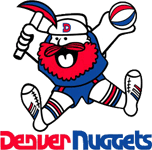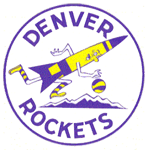Denver Nuggets

Historical Moments:
1967/68: The city of Denver, which last had hosted professional basketball in 1950 when the Nuggets folded in the early days on the NBA, was selected to receive a charter franchise in the upstart American Basketball Association after a deal with Kansas City fell through. Seeking solid ownership, the ABA selected Bill Ringsby, the owner of the Denver-based “Ringsby Rocket” Trucking Systems, to own the team. It was only natural that the team be named Rockets. On October 15th, the Rockets took the floor for the first time beating the Anaheim Amigos 114-105. The Rockets would go on to finish in third place with a record of 45-33. In the playoffs, the Rockets would go on to lose to the New Orleans Buccaneers in five games with the home team winning all five games.
1968/69: The Rockets continued to be a playoff contender with a record of 44-34 finishing in third place for the second year in a row. In the playoffs, the Rockets would give the Oakland Oaks all they can have alternating wins before falling in seven games to the eventual ABA Champions.
1969/70: The Rockets felt the ire of the NCAA, NBA, as well as other ABA owners when they signed University of Detroit Sophomore star Spencer Heywood. Claiming hardship Heywood was the first underclassman to jump college early for the pros. Heywood was a dominant force, winning the Rookie of the Year, and MVP, while leading the league in scoring and rebounding as the Rockets overcame a 9-19 start to win the Western Division with a record of 51-33. In the playoffs, the Rockets would be pushed to the limit by the Washington Caps, who had beaten them a season earlier in a seven-game series as the Oakland Oaks. In Game 7 in the Mile High City, the Rockets would explode, winning 143-119 to reach the Division Finals. However, in the divisional finals, the Rockets would fall in five games to the Los Angeles Stars, losing four straight games, after taking Game 1.
1970/71: After winning their first division title, the Rockets expected to be even stronger. However, after two preseason games, Spencer Heywood left the Rockets over a contract dispute to sign with Seattle Supersonics. The Rockets and Heywood would embark on a legal battle, but in the end, the Rockets would lose, and Heywood would go on to a solid NBA career. While holding out hope Heywood return, the Rockets struggled to post a 30-54 record. Despite their poor mark, the Rockets finished tied for fourth place and had a chance to play themselves into the playoffs. However, the Rockets would fall to the Texas Chaparrals 115-109 in a one-game playoff.
1971/72: The Rockets would make a return to the playoffs despite a poor record of 34-50, under Hall of Fame coach Alex Hannum. In the playoffs, the Rockets would give the Indiana Pacers all they could handle, pushing the eventual champions to seven games before they lost by two points in the series finale in Indiana.
1972/73: With Warren Jabali, who the Rockets acquired in the Miami Floridians dispersal draft, the Rockets became a tougher team posting a solid record of 47-37 while finishing in third place. However, in the playoffs, the Rockets would run out of fuel, falling to the Indiana Pacers in five games.
1973/74: The Rockets would undergo an ownership change as Bill Ringsby sold the team to A.G. “Bud” Fischer and Frank M. Goldberg. On the court, the Rockets had essentially the same team but struggled all season, finishing with a disappointing 37-47 record. Needing to win a play in game to reach the playoff, the Rockets would fall to the San Diego Conquistadors by 20 points.
1974/75: In the offseason, the ABA in the franchise would undergo a complete renovation top to bottom as their name was changed to Nuggets paying homage to Denver’s first pro team while placing in position to join the NBA by avoiding confusion with the NBA’s Houston Rockets. On the court, changes were radical too as the Nuggets hired Carl Scheer from the recently folded Carolina Cougars. Scheer would bring half the Cougars with him, including Coach Larry Brown. The move would revitalize the franchise right away as the Nuggets finished in first place with an ABA best 65-19 record. In the playoffs, the Nuggets would fly past the Utah Stars in six games to reach the Western Finals. However, in the semifinals, the Nuggets would be stunned by the Indiana Pacers in seven games.
1975/76: As the season began, the Nuggets had a brand new arena and an uncertain future as the ABA was on its last legs with the league down to seven teams after two teams folded early in the season. Mc Nichols Arena would host that year’s All-Star Game since the league was down to seven teams the Nuggets would take on All-Stars form the other six teams. To add spice to the games festivities, the Nuggets decided to hold a dunk off between star rookie David Thompson and New York Nets star Julius Erving. Dr. J would steal the show, but the Nuggets won the game. The Nuggets would go on to finish in first place with a record of 60-24. In the playoffs, the Nuggets would need seven games to get past the Kentucky Colonels and into the ABA Finals. In the Finals, Julius Erving would again steal the show as the Nuggets fell to the New York Nets in what would turn out to be the last ABA Championship Series. The ABA would cease operations shortly after the game, but the Nuggets would be among four teams joining the Nets, Indiana Pacers, and San Antonio Spurs to join the NBA.
©MMXX Tank Productions. Stats researched by Frank Fleming, all information, and team names are property of the American Basketball Association. This site is not affiliated with the Denver Nuggets or the ABA. This site is maintained for research purposes only. All logos used on this page were from Chris Creamer’s Sports Logos Page.
Page created on June 18, 2012. Last updated on April 8, 2020, at 12:00 am ET.



